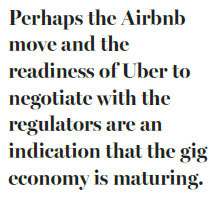Uber spat a bump in road for 'gig' economy

Regulators will always be needed to make sure consumers and workers do not suffer unintended consequences
The seemingly inexorable advance of the so-called "gig" economy hit a minor bump in the road this month when taxi-hailing company Uber lost its license to operate in London, one of its biggest markets.
Transport for London, the industry regulator in the British capital, said a number of negative factors, including Uber's failure to make adequate background checks on drivers, meant it was not a fit and proper company to hold a private vehicle hire license.
No doubt in the hope of resolving the spat with the regulator, Dara Khosrowshahi, the new CEO of the California-based company, opted for contrition. In an internal memo to employees, he acknowledged "there is a high cost to a bad reputation".

"It's critical that we act with integrity in everything we do," he wrote. "And learn how to be a better partner to every city we operate in."
That is already a bit of a climbdown for the representative of one of the main Silicon Valley technological innovators whose unofficial slogan is "disrupt first, ask questions later".
As the internet-driven gig economy has come to dominate a whole range of goods and services - from books and groceries to fast food deliveries and taxi rides - "disruption" has become a buzzword.
Throwing existing service structures up in the air and seeing what comes down may not be the most scientific model. However, it promises huge potential returns to gig investors at the expense of traditional providers.
Gig innovators portray themselves as refreshingly New Age and libertarian as they promise to free consumers and workers from the constraints of the old economy.
"Flexibility" is another buzzword, often applied to low-income, freelance workers who are told they now have the freedom to work only when they want to. In reality, flexibility mainly favors the operator, who is the one who determines how much work is actually available.
An upsurge in self-employment in countries such as Britain - almost 5 million people at the last count - may have more to do with the absence of secure jobs than with an innate desire of low-paid workers to "be their own boss".
However, in another phrase that could also be the unofficial slogan of the gig innovators, "you can't stop progress". The new economic model is too far advanced to be reversed by isolated regulatory diktats. The gig revolution has spread well beyond Silicon Valley to infiltrate the global economy and inspire competitors.

In London, Uber was already facing competition from Taxify, an Estonian taxi app backed by China's car-booking group Didi Chuxing. Acknowledging that companies must take into account the views of regulators, CEO Markus Villig promised: "The safety of riders is Taxify's top priority and we are currently working with (Transport for London) to ensure we comply with all of their regulatory requirements and safety standards."
The gig economy has brought undoubted benefits to consumers in terms of convenience and pricing and has created many new jobs, despite the concerns about their security.
But there will always be a need for gatekeepers in the shape of regulators, who are responsible for making sure that consumers and workers do not suffer the unintended consequences of gig-style disruption.
In the face of a tougher regulatory climate, Airbnb, the booking app that allows visitors to arrange short-term stays in private residences, announced restrictions this year on the use of its service in London. One unintended consequence of such holiday rental services had been to reduce the supply of homes for ordinary Londoners.
Perhaps the Airbnb move and the readiness of Uber to negotiate with the regulators are an indication that the gig economy is maturing. Ethically examining the likely consequences of innovation may eventually overtake the disruptive gig mantra of throwing everything up in the air and watching it come crashing down.
The author is a senior editorial consultant for China Daily. Contact the writer at harveymorris@gmail.com.
(China Daily European Weekly 09/29/2017 page11)
Today's Top News
- Israel agrees to conditions to finalize 60-day Gaza ceasefire
- Xi: Advance building of unified market
- US chip restrictions backfiring
- Consumption push promises summer tourism boom
- Namibian FM highlights China's role in progress
- Policy effort to bolster growth bears fruit






























